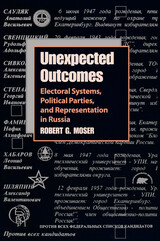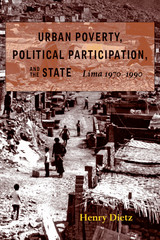3 start with U start with U

Can democratization be promoted by “getting the institutions right?” In Unexpected Outcomes, Robert G. Moser offers a compelling analysis of the extent to which institutions can be engineered to promote desired political outcomes. The introduction of democracy in Eastern Europe and the former USSR has enabled scholars to bring new perspectives to the debate about electoral systems. Russia is arguably the most important of the postcommunist states and its mixed electoral system provides an interesting controlled experiment for testing the impact of different electoral systems.
Moser examines the effects of electoral systems on political parties and representation in Russia during the 1990s. Moser’s study is not only a highly original contribution to our understanding of contemporary Russian politics, but also a significant step forward in the comparative study of electoral systems. Through his comprehensive empirical analysis of Russian elections, Moser provides the most detailed examination of a mixed electoral system to date. This system was introduced in Russia to encourage party formation and benefit reformist parties allied with President Yeltsin. However, the effects were contrary to what the creators of the system expected and also defied the most well-established hypotheses in electoral studies. Parties proliferated under both the PR and plurality halves of the election and patterns of women and minority representation ran counter to prevailing theory and international experience.
With an epilogue that updates the study through the December 1999 elections, Unexpected Outcomes makes an important and timely contribution to the ongoing debate over the ability and inability of elites to fashion preferred political outcomes through institutional design.


Susan Welch and Timothy Bledsoe clarify a portion of the debate by investigating how election structures affect candidates and the nature of representation. They examine the different effects of district versus at-large elections and of partisan versus nonpartisan elections. Who gets elected? Are representatives' socioeconomic status and party affiliation related to election form? Are election structures related to how those who are elected approach their jobs? Do they see themselves as representatives concerned with the good of the city as a whole?
Urban Reform and Its Consequences reports an unprecedented wealth of data drawn from a sample of nearly 1,000 council members and communities with populations between 50,000 and 1 million across 42 states. The sample includes communities that use a variety of election procedures. This study is therefore the most comprehensive and accurate to date.
Welch and Bledsoe conclude that nonpartisan and at-large elections do give city councils a more middle- and upper-middle-class character and have changed the way representatives view their jobs. Reform measures have not, however, produced councils that are significantly more conservative or more prone to conflict. Overall, the authors conclude that partisan and district elections are more likely to represent the whole community and to make the council more accountable to the electorate.
READERS
Browse our collection.
PUBLISHERS
See BiblioVault's publisher services.
STUDENT SERVICES
Files for college accessibility offices.
UChicago Accessibility Resources
home | accessibility | search | about | contact us
BiblioVault ® 2001 - 2024
The University of Chicago Press









